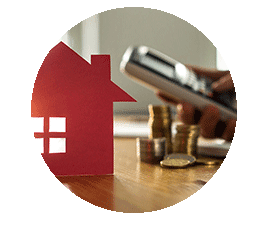If you're like many Canadians, you might be considering finally buying a second home like you've always wanted.
Where do you start when it comes to purchasing a second home? There are many factors to consider before you buy your second home. Whether you want to turn it into an income property or use it as your vacation home, you'll need to understand and navigate how to finance this property.
In this article, we help you understand the seven most important factors to consider before purchasing your next home. We detail the top considerations and ways to finance a second home.
1. Property Type
Before buying a second home, the first step is to consider the property type. Your insurance and mortgage options depend on if it's an investment property, vacation home, or if you'll be living there full-time. Consider houses and apartments in the area and select one that fits your needs.
You should spend your money on a place you can comfortably afford and see yourself living at in the future. A vacation house isn't always the best option. You'll need to ensure that you can afford property taxes, insurance, and other expenses.
Vacation properties have lower down payments than rentals, but for many homeowners, having a vacation home isn't worth the extra expense. Other homeowners make the most out of their vacation homes throughout the year with frequent trips or subletting to renters.
Income or investment properties allow some financial gain. You may consider purchasing a second home for extra income or renting a vacation home to others throughout the year to use yourself during the holidays. You'll still pay taxes but can easily cover other costs after paying a large down payment.
2. Utility Expenses
Utilities are a significant consideration as you'll need lighting, running water, and temperature control in your second home. Vacation homes and rental homes require the same utilities, but the usage differs. Occupied rental homes require continuous utilities, while you may only need utilities during certain parts of the year while you stay in your vacation home.
Think about what utilities you'll need to pay. Which ones you get also depends on your property type and its location. Do you have access to certain fuel or power types, such as natural gas or solar power?
Whether you're buying a second home for occasional stays or frequent visits, you'll need to have enough money to keep utilities on and solve utility-related problems if they arise. Power outages, burst pipes, and other problems require ample finances. Your vacation home's utility usage may significantly differ depending on your usage. Be sure to calculate your projected utilities before closing on a new property. If you're renting, you'll need to ensure that rental costs cover utility expenses and allow you extra room for resolving emergency problems.
3. Insurance Considerations
Another easily forgettable factor to consider when buying a second home is insurance. These unavoidable costs are necessary to protect your property. You'll need to purchase insurance as soon as you select a property.
The types of insurance you'll need vary depending on your property type and location. If you're planning to buy a condo by the beach, you'll need renter's insurance and potential storm damage insurance. If you want a house in the country, consider mortgage insurance to protect your new purchase.
What about the weather in the area around your property? Will you need extra protection against flooding or earthquakes, or will property maintenance be difficult due to the home's location?
Consider your new home's neighbourhood and the overall city. Is the area safe for you to have a vacation home, or is it a hotspot for break-ins? Get to know the area well so you know how to best protect your property with insurance.
4. Refinancing Your Existing Mortgage
Buying a second home requires significant finances, but you can also do this without losing your first home. Despite increasing mortgage rates in Canada, refinancing your existing mortgage can help you find equity and qualify for a lower down payment on your second property. Any money you save from refinancing can go towards your new home's purchase.
If you've owned your home for many years, added to its value, paid your mortgage consistently, or if real estate prices have increased, you can build significant equity. This equity becomes available when you refinance your home.
Refinancing is an excellent way to avoid taking out a second mortgage on your home. If your home has enough equity, you can use it to get around a 20% or higher down payment. With this equity and additional finances, you can purchase your vacation or rental home successfully.
Depending on the property type, you'll need to consider how much banks require. Rental properties incur higher down payments of 25% or more, while vacation homes have lower down payments. You can refinance and access equity up to 80% of the value of your home.
5. Getting a Second Mortgage
When buying a second home in Canada, getting another mortgage is possible. You'll refinance your first home and get a loan from the bank that also covers your initial loan amount. This method makes it easier to own multiple properties and pay for them.
It's imperative to understand the risks of this option despite the many benefits. Unfortunately, failure to upkeep the payments may result in losing your initial property.
Like refinancing your home to use equity, your maximum loan amount won't surpass your home's value by more than 80%. Sometimes you can get even higher financing options when working with private insurance providers. However, working with a private insurance company brings a higher interest rate.
How Much of a Second Mortgage You Can Afford?
See how much of a second mortgage you can afford with a Mortgage Affordability Calculator.
calculate now6. Considering a Home Equity Line of Credit
Before buying a second home, consider paying for it with a home equity line of credit (HELOC). A home equity line allows you to access additional equity from your original home's mortgage. You'll reach higher financing ratios by combining the HELOC with the first mortgage.
Many people opt for a HELOC due to its lower interest rate. This continuous line of credit allows you to borrow as necessary and repay after a certain period. Interest rates may change, but they'll remain low overall.
Canadian banks won't process property purchases from other countries. You can refinance using a home equity line of credit if the home you plan to purchase isn't in Canada. Set up financing on your initial home, then use the cash from your first home's equity to purchase your new residence outside the country.
7. Meeting the Down Payment with Cash and Financing
Insurance is necessary for all property transactions in Canada if you pay less than 20% down. If you have only 5% or more in cash for the down payment, many insurance companies will finance the rest of your home's cost. This option is one of the most popular for purchasing another home.
You'll set up a financing plan and confirm with the insurance provider that your income covers all other expenses, such as utilities and taxes. You'll also need excellent credit.
Explore Home Insurance Rates with Insurdinary
Whether you're buying a second home to spend more time with family members or purchasing another property for income purposes, you need ample protection in case of an accident. Home insurance keeps your property safe when disaster strikes.
At Insurdinary, our professionals help you get the best home, auto, life insurance quotes, and more. We help you find and compare the top home insurance plans that protect your property.
Do you need an accurate home insurance quote when buying a second home? Get a quote for home insurance when you fill out our online form and get more information on available home insurance plans with help from Insurdinary when you contact our team.




